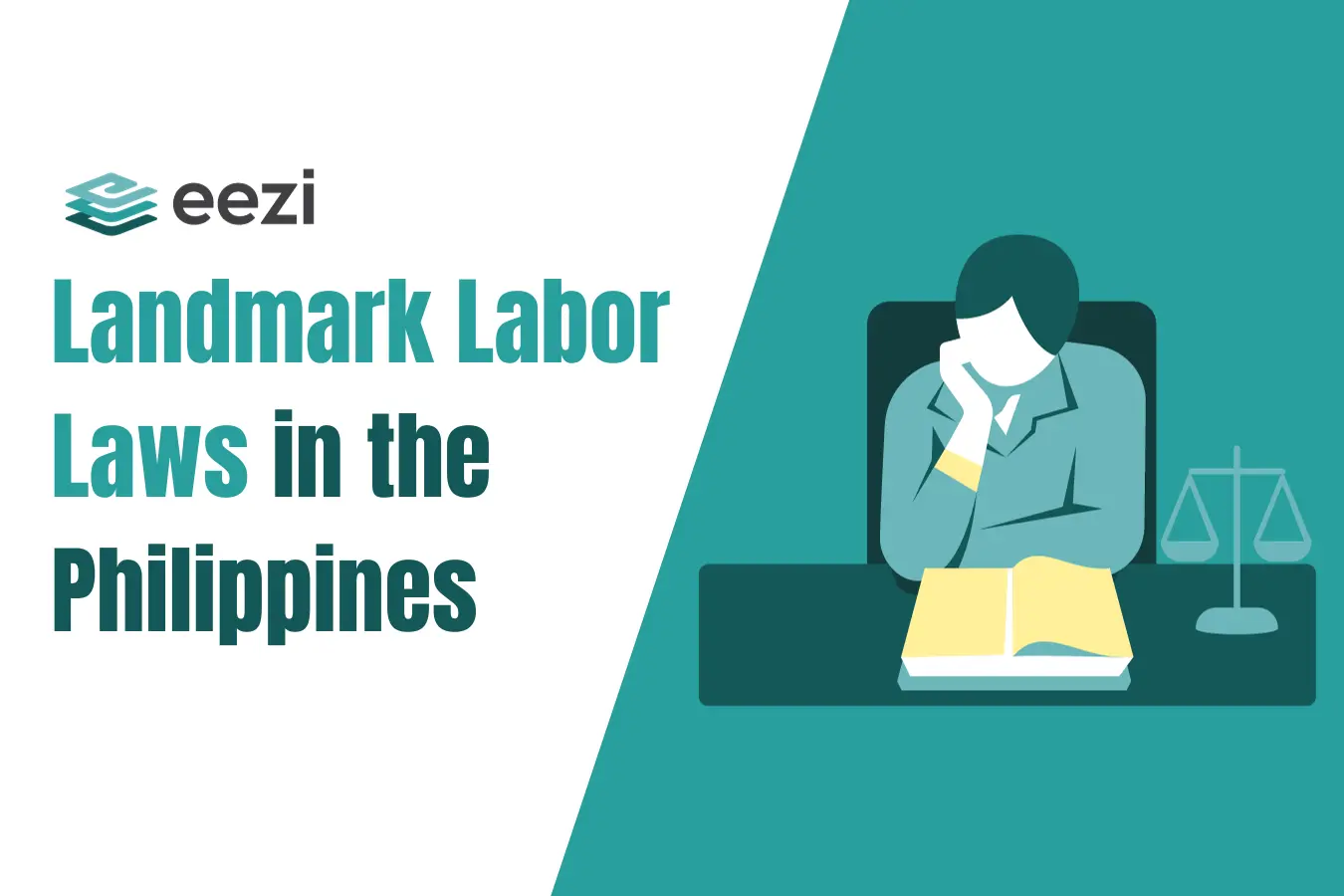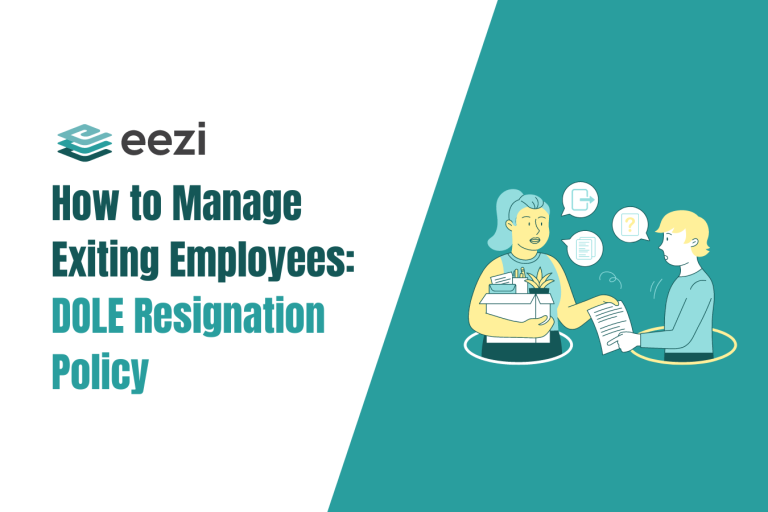Here are the landmark Labor Laws in the Philippines that every employer should know about.

Philippine employers should always be aware of important labor laws shaping workforce management.
These laws highlight key factors, including the foundational Labor Code and recent enactments. Such important laws include the Expanded Maternity Leave Law and the Occupational Safety and Health Standards Law.
As the Philippine legal framework evolves, understanding and compliance with these landmark laws are essential for employers to create a balanced and equitable work environment for employees.
Here are some of the most notable and encompassing employment laws that employers should be aware of:
Labor Code of the Philippines or the Presidential Decree No. 442
The Labor Code governs labor and employment practices in the country. It covers various aspects such as employment relationships, wages, job security, benefits, and termination procedures.
General Coverage of the Philippine Labor Code
The basics of this employment law are as follows:
Safeguarding labor
The government is mandated to safeguard labor by fostering full employment. These laws guarantee equal work opportunities regardless of gender, race, or creed and oversee the employment relationship between workers and employers.
Ensuring workers’ rights
- Self-Organization: This refers to the right of workers to form or join labor unions or associations of their own choosing for the purpose of promoting and protecting their interests.
- Collective Bargaining Agreements: CBAs are agreements negotiated between employers and labor unions that govern various employment terms and conditions, including wages, benefits, and working hours. Employers must honor the provisions outlined in these agreements.
- Security of Tenure: This principle ensures that employees cannot be dismissed from their jobs without just or authorized cause and observance of due process. It protects employees from arbitrary termination.
- Right to employee benefits: This encompasses various benefits mandated by law or negotiated through collective bargaining, such as social security, health insurance, leave entitlements, and retirement benefits.
- Humane working conditions: Employers are required to provide a work environment that is safe, clean, and conducive to the well-being of employees. This includes ensuring proper ventilation, lighting, sanitation facilities, and compliance with occupational health and safety standards.
By prioritizing these principles, the government establishes a fair and just work environment in recognition of the crucial role of labor in national development.
eezi HR Guide
Stay compliant with the required employee benefits in the Philippines.
Tax Reform for Acceleration and Inclusion (TRAIN) Law or the Republic Act (R.A.) 10963
Pimarily a tax reform law, RA 10963 has an impact on employees’ take-home pay. Consequently, this also affected their net income due to changes in tax brackets and deductions.
Known as the Tax Reform for Acceleration and Inclusion (TRAIN), RA 10963 fulfills the diverse needs of the Filipino workforce.
Moreover, it aims to enhance public welfare by improving collections. As such, it also improves the allocation of resources to key sectors, such as infrastructure, health, education, employment, and social protection.
The TRAIN Law
Through TRAIN, the Philippine government optimizes revenue collection while highlighting the importance of job creation and social protection measures. This reinforces the government’s role in fostering a secure and prosperous environment for its people.
eezi HR Guide
Stay updated with SSS, PhilHealth, Pag-IBIG, and BIR processes.
Expanded Maternity Leave Law or the Republic Act (R.A.) 11210
This new maternity law extends the maternity leave period from 60 to 105 days. Moreover, beneficiaries have the option to extend their leave for an additional 30 days without pay.
Article XIII, Section 14 of the 1987 Constitution safeguards and advances the rights and well-being of working women.
This constitutional provision specifically recognizes the importance of considering women’s maternal functions in the workforce.
It also aims to create an environment that facilitates the realization of the full potential of female Filipino employees in their professional pursuits. Hence, the Expanded Maternity Leave Law.
This law addresses the unique challenges and contributions of female Filipino employees. In addition, this constitutional mandate reflects a commitment to gender equality and inclusivity.
Read more: Learn the rules of service incentive leave in the Philippines. See the guide here.
Occupational Safety and Health Standards Law or Republic Act (R.A.) 11058
This Philippine employment law aims to promote and maintain a safe and healthy working environment. As such, it establishes standards for occupational health and safety.
RA 11058, otherwise known as the Occupational Safety and Health Standards Law, outlines the responsibilities of employers, workers, and all concerned parties in ensuring occupational safety and health (OSH) standards within the Philippine workforce.
Scope and Jurisdiction of Republic Act (R.A.) 11058
RA 11058 covers all establishments, projects, and work sites across various economic activities, excluding only those in the public sector.
In addition, entities regulated by the Philippine Economic Zone Authority (PEZA) fall under the sanctions of this law.
Addressing Potential Occupational Hazards
RA 11058 affirms workers’ rights to the following:
- Comprehensive knowledge of workplace hazards
- The prerogative to refuse unsafe work
- The prerogative to report accidents to relevant authorities
- The provision of personal protective equipment (PPE) as deemed necessary
Covered workplaces must have a comprehensive safety and health program overseen by an OSH Committee to ensure strict implementation.
The Need and Role of On-Site Health Personnel
A qualified Safety Officer should be appointed to oversee and manage the program comprehensively.
These workplaces further need to maintain on-site occupational health personnel, including physicians, nurses, certified first aiders, and dentists, along with the requisite medical supplies, equipment, and facilities.
eezi HR Guide
Stay up to date with health and safety regulations.
Wage Rationalization Act or the Republic Act (R.A.) 6727:
This law rationalizes wage policy and promotes productivity improvements, ensuring the equitable distribution of income among workers.
RA 6727, or the Wage Rationalization Act of 1989, ensures fair labor practices, economic growth, and social development.
Setting Wage Baseline and Standards
Its primary objectives are:
- To establish rationalized minimum wage standards
- To encourage initiatives that enhance worker productivity and equitable wealth distribution
Overall, the goal is to provide Filipino employees and their families with a decent standard of living.
To achieve this, the policy promotes collective bargaining agreements as the primary mechanism for determining wages and employment conditions. This empowers workers to negotiate their terms of employment or employment contracts effectively.
Reinforcing the Policy
The policy recognizes the need for periodic adjustments to minimum wage rates. This is to account for regional variations in the cost of living and socio-economic factors. These adjustments shall also be fair and equitable, ensuring that workers receive just compensation as indicated in their employment contracts.
Moreover, the policy aims to stimulate employment opportunities in rural areas through industry dispersal. Lastly, it acknowledges the importance of allowing businesses and industries to achieve reasonable returns on their investments, fostering expansion and growth in the nation’s economy.
The NWPC and its Role in the Labor Code
With the creation of RA 6727, the government established the National Wages and Productivity Commission (NWPC). They hold the key responsibility of setting the base pay or minimum wage of workers across regional, provincial, and industry levels.
They also facilitate productivity enhancement initiatives and the promotion of gainsharing schemes. The latter mostly focuses on micro, small, and medium enterprises. As such, the commission plays a crucial role in ensuring equitable compensation practices and incentivizing productivity improvements.
The Act Allowing the Employment of Night Workers or the Republic Act (R.A.) 10151
RA 10151, otherwise called the Act Allowing the Employment of Night Workers, is an amendment to Article 154 of the Labor Code that prohibits work at night.
The legislation stipulates that the term “night workers” is applicable to all individuals engaged in night labor. However, there are exceptions to those involved in agricultural, livestock, fishing, maritime transport, and inland navigation activities.
By law, night work is a continuous period of no less than seven (7) hours, which includes the span of time between midnight (12:00 AM) and five o’clock in the morning (5:00 AM).
Restructuring the Labor Code
With RA 10151 in place, Articles 130 and 131 of Presidential Decree Number 442, otherwise known as “The Labor Code of the Philippines,” saw some restructuring.
This legal framework seeks to ensure the well-being and rights of night workers. At the same time, it takes into account the needs and challenges associated with nighttime employment, including night shift differential pay and night work safety.

Other Important Employment Laws
Labor Laws for Female Employees
Female labor rights guarantee parity between men and women in the workplace, emphasizing equal opportunities. As stipulated in the Philippine Labor Code, employers need to provide special protection and safety measures for women.
This legal provision highlights the need for an inclusive and secure work environment, recognizing female employees’ distinct needs and concerns. It aims to eliminate gender-based discrimination, ensuring that women can fully participate in the workforce. This is with the assurance of equal treatment, rights, and protections that their male counterparts enjoy.
Republic Act (R.A.) 9710: The Magna Carta for Women
Most notable among all legislation regarding women and employment is RA 9710, or The Magna Carta of Women.
The Magna Carta of Women (MCW) upholds the human rights of women in the Philippines. Its mission extends beyond the mere eradication of discrimination. Instead, the law acknowledges, protects, fulfills, and promotes the rights of Filipino women, with particular emphasis on those in marginalized sectors.
The Role of the Magna Carta for Women
By providing a robust legal framework, the MCW strives to foster gender equality and empower women, acknowledging the importance of their role in society. This legislation reflects the nation’s commitment to dismantling gender-based disparities. Lastly, it also aims to create an inclusive environment where women can thrive and contribute meaningfully to societal progress.
Women’s Rights in the Workplace
Work and employment concerns are specifically addressed in Article 11 of the MCW. The section specifies that female employees are entitled to equal employment rights, ensuring non-discrimination based on marital status or maternity.
This principle emphasizes the government’s commitment to gender equality in the workplace, promoting fair treatment and opportunities for women without prejudice, and acknowledging their right to pursue careers and personal aspirations without bias.
Philippine Labor Laws on Minimum Wage Earners
Individuals classified as minimum wage earners are those whose earnings fall within the legally stipulated base wage. This predetermined minimum is established by the Regional Tripartite Wage and Productivity Board (RTWPB), an entity operating under the purview of the Department of Labor and Employment (DOLE).
The Key Role of the RTWPB
The RTWPB’s role is pivotal in determining and periodically adjusting the minimum base wages to reflect economic changes, regional disparities, and the cost of living, ensuring that workers receive fair compensation. This regulatory framework safeguards the rights of minimum base wage earners, aiming to uphold their economic well-being and standard of living.
Republic Act (R.A.) 602 (Minimum Wage Law)
RA 602, or the Minimum Wage Law, was approved on April 6, 1951, with the aim of setting a minimum or base wage for laborers in the Philippines. This is set and adjusted by the Regional Tripartite Wage and Productivity Boards (RTWPBs) at the regional level.
These boards, established in various regions across the country, are under the supervision of the National Wages and Productivity Commission (NWPC).
Factors for Determining Minimum or Base Wages
The minimum or base wage rates vary by region, taking into account factors such as the cost of living, the employment rate, and the economic situation in each specific region. The RTWPBs periodically review and adjust the minimum wage rates to ensure that workers receive fair compensation.
Employers are obligated to comply with the minimum and base wage rates set by the RTWPB in the region where their business operates.
Republic Act (R.A.) 4180 (An Act Amending R.A. 602 by Raising the Minimum Wage for Certain Workers and Other Purposes)
Increasing the minimum and base wage of certain types of workers and laborers serves to safeguard workers from unjustly low pay. The primary objective of RA 4180 is to establish an increase in the base pay of workers, which aims to grant a fair and equitable distribution of income benefits to all members of the workforce.
Setting a standard for base compensation reinforces the principle that every worker deserves remuneration that reflects not only their contributions to productivity but also ensures their basic needs are met.
Read more: Minimum Wage in the Philippines
Philippine Labor Laws Governing Separation Pay
Separation pay refers to supplemental compensation granted to employees when their employment is terminated for valid business reasons, such as the implementation of labor-saving devices, redundancy, or retrenchment.
This financial provision acknowledges that these employees bear no responsibility for the termination, as it results from genuine business needs, and that employers cannot terminate employees without just cause.
By offering separation compensation, employers aim to provide a degree of financial assistance to affected individuals during their transition out of employment.
Retrenchment
Article 283 of the Labor Code of the Philippines, Book Six (Presidential Decree No. 442, as Amended), states that:
When retrenchment becomes vitally important to prevent financial losses or in instances of closure or cessation of operations unrelated to severe business downturns, specific guidelines determine separation pay.
Employees affected by such measures are entitled to compensation equivalent to one month’s salary or a minimum of one-half month’s pay for each year of dedicated service, with the higher of the two prevailing. Notably, a fraction of at least six months is deemed a full year, ensuring equitable treatment.
Employee Termination and Separation Pay
Generally, employers can terminate employees for just causes such as serious misconduct, willful disobedience, and gross habitual neglect of duty. Workers terminated under the above-mentioned conditions are typically ineligible for separation compensation.
The exclusion of separation benefits in such cases aligns with the principle of accountability, reinforcing the notion that individuals terminated for just causes bear responsibility for their actions, and the repercussions extend to their entitlements in terms of post-employment benefits.
Probationary Employment and Separation Compensation
A separation package is mandated for termination cases falling under Article 293 or 294 of the Labor Code of the Philippines, including probationary employees.
The same principle extends to contractual employees, highlighting equitable treatment across different employment categories.
Labor Laws Regarding Retirement Pay
Retirement benefits and pay are a form of extra compensation granted to employees upon retirement.
Beyond mere financial remuneration, retirement benefits recognize the invaluable contributions of long-serving individuals, providing a tangible expression of gratitude for their dedicated commitment.
Employment laws for retirees in the Philippines aim not only to ensure financial security for retirees but also to honor and appreciate the professional allegiance of employees to their employers.
Republic Act 8291 (GSIS Act of 1997)
Employees in the government sector are eligible for retirement pay after rendering a minimum of 15 years of service and attaining a minimum age of 60. The eligibility of retirement pay employees is contingent on their not being permanent total disability pensioners.
13th-month pay
Every employee with a minimum of one month of service in the calendar year is eligible for the 13th month pay, including regular, probationary, and casual employees.
However, contractual workers do not automatically receive the 13th-month pay unless expressly stipulated in their contractual agreement.
Read more: 13th-Month Pay Rules in the Philippines
Transform your HR and payroll processes with eezi.
Unlock enterprise-level features and streamline your operations effortlessly. Take control of your business’s efficiency and success—choose eezi today!



